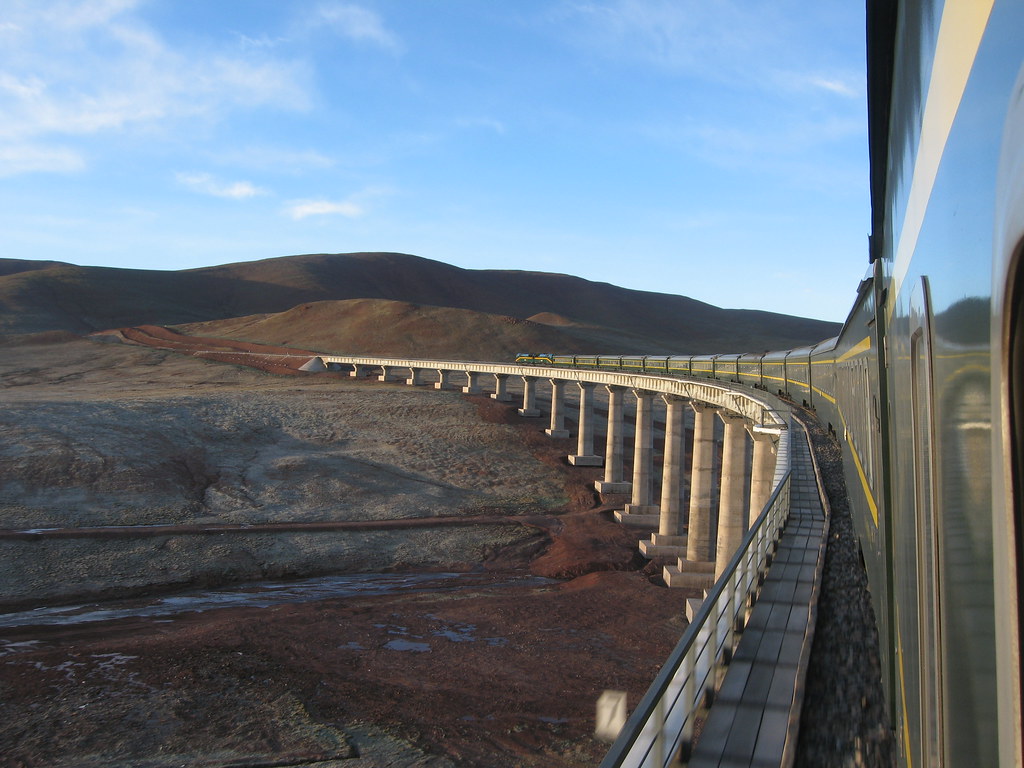The Highest Train Journey in The World ....
After 45 hours of smooth train riding we have arrived in the Tibetan capital of Lhasa. We spent the first night on the train from Chengdu to Xining on a normal sleeper train before transferring to the swanky "Rocket to the rooftop of the world" in the afternoon. This superdooper train has state of the art engineering and is more spacious and comfortable than your average Chinese sleeper trains. During the train swapping process there was an excited rush of local tourists who barged onto the new train to claim their territory - even though it's seat assigned and we were all to sleep in the same bed number, and thus the same position on the train as the previous night. Once settled it wasn't long before all the equipment and facilities were put through their paces and all the computerised gauges admired. The only complaint on board was that the hot water tank, a vital necessity in the noodle making process, was slow to heat up so there were lots of people wandering around with dry noodles bowls at a loss what to do.
During the first hour on the new train we were subjected to a lengthy description of altitude sickness and every possible affect it could have on the human body. To be honest it went from funny to slightly unsettling. At the end of the health lesson there was a stern announcement of ...."Smoking is very very bad for you - this is a non smoking train" ... yeah right no such luck more like the kind where everyone smokes in between the carriages and waves the smoke towards non existent air vents.

The most interesting section of the train line is between Golmud and Lhasa, it's here that the special diesel engines, capable of operating efficiently at 3-mile-high altitudes, get put to the real test running over track laid on permafrost.

Out the window we saw some incredible scenery, snow capped mountains were plentiful. We also whizzed passed China's largest freshwater lake, Qinghai Lake. Due to the altitude along this section oxygen is pumped into the train cabins to fend off altitude sickness. Although I'm not sure how much sense this makes if you have to get out and breathe the real air when you arrive in Lhasa.
On the final morning on the train we were all roused at dawn by loud music. The amusing thing about long train journeys in China is that everyone gets up really early in the morning and then discovers that there's nothing to do and ends up going back to bed again. By the last morning some passengers discovered that the oxygen nozzles over each bed were now dispensing air once turned. It spread like wildfire and pretty soon everyone had their nostrils up against the valves taking deep breaths - for it to function correctly a tubed face mask must be connected up! In our carriage a woman "suddenly" became overcome with sickness and was dragged to the next carriage and back again by well wishers, with so many helping and rubbernecking they completely crowded her out so it was hardly surprising that she was overcome and couldn't breathe.
We reached Lhasa earlier than expected and stepped out of our "safe oxygen" chamber and out into the "real air".... everyone quickly forgot about the thin air and in true Chinese style rushed at full speed towards the exit and onto the bus to bags seats.
During the first hour on the new train we were subjected to a lengthy description of altitude sickness and every possible affect it could have on the human body. To be honest it went from funny to slightly unsettling. At the end of the health lesson there was a stern announcement of ...."Smoking is very very bad for you - this is a non smoking train" ... yeah right no such luck more like the kind where everyone smokes in between the carriages and waves the smoke towards non existent air vents.

The most interesting section of the train line is between Golmud and Lhasa, it's here that the special diesel engines, capable of operating efficiently at 3-mile-high altitudes, get put to the real test running over track laid on permafrost.

Out the window we saw some incredible scenery, snow capped mountains were plentiful. We also whizzed passed China's largest freshwater lake, Qinghai Lake. Due to the altitude along this section oxygen is pumped into the train cabins to fend off altitude sickness. Although I'm not sure how much sense this makes if you have to get out and breathe the real air when you arrive in Lhasa.
On the final morning on the train we were all roused at dawn by loud music. The amusing thing about long train journeys in China is that everyone gets up really early in the morning and then discovers that there's nothing to do and ends up going back to bed again. By the last morning some passengers discovered that the oxygen nozzles over each bed were now dispensing air once turned. It spread like wildfire and pretty soon everyone had their nostrils up against the valves taking deep breaths - for it to function correctly a tubed face mask must be connected up! In our carriage a woman "suddenly" became overcome with sickness and was dragged to the next carriage and back again by well wishers, with so many helping and rubbernecking they completely crowded her out so it was hardly surprising that she was overcome and couldn't breathe.
We reached Lhasa earlier than expected and stepped out of our "safe oxygen" chamber and out into the "real air".... everyone quickly forgot about the thin air and in true Chinese style rushed at full speed towards the exit and onto the bus to bags seats.



1 comments:
These photos are incredible, guys - love the thought of Chinese Chain-smokers sucking in oxygen.
Post a Comment